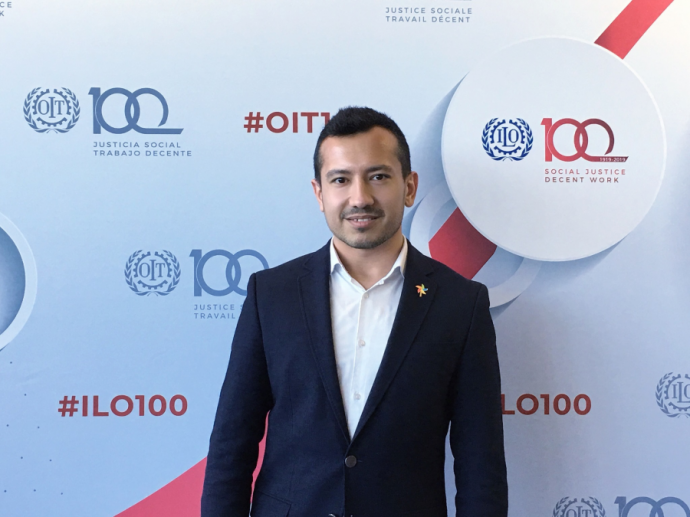

Bobur Nazarmuhamedov is a young professional from Uzbekistan with over 8 years of professional experience and proven track record in the fields of political affairs, child labour, economic affairs, regional planning and development. He currently works as a Programme Officer at the International Labour Organization (ILO) Headquarters in Geneva. Prior to joining ILO, he has held diverse professional positions in different sectors (private sector, NGOs, international organizations), through which he developed strong managerial and organizational skills. After graduating from the OSCE Academy in Bishkek, Kyrgyzstan in 2011 with an MA in Politics and Security (Central Asia), he first moved to Vienna. In Vienna, he worked as a Programme Management Officer at the OSCE – The Organization for Security and Co-operation in Europe Secretariat and coordinated implementation of projects aimed at strengthening co-operation among 57 National Focal Points of the OSCE Border Security and Management Network. He then moved to the Hague to work as a Monitoring and Evaluation Officer at the Office of the OSCE High Commissioner on National Minorities, where he was responsible for monitoring and preparing analytical reports on political and security-related developments in Southeastern European countries. Besides Uzbek, his mother tongue, he speaks English, Russian and Turkish, and is now learning French. He holds a PhD degree in International Development, from the University of Tsukuba, Japan.
«Enrolled in interdisciplinary MA Programme in Politics and Security of the OSCE Academy in Bishkek, I have significantly broadened my understanding of ongoing political processes in the region and beyond. Excelled academically throughout my studies at the Academy I was able not only to gain a valuable academic experience, but I also got a unique opportunity to develop my professional skills in an internship position at the OSCE Secretariat in Vienna. My assignment to the Office of the Co-ordinator of OSCE Economic and Environmental Activities went like the blink of an eye, but it was enough to change my entire vision of climate change and security nexus. I gained a different awareness about the linkage between environmental degradation and security and to the impact climate change might have on the stability and the entire development process in the OSCE region. Subsequently, I developed my experience into a specialist paper, and I was invited to present my findings at the 2nd OSCE Academy conference on Central Asian Comprehensive Security and Sustainable Development.
Studying at the OSCE Academy equipped me with a strong background in various aspects of regional and international politics and as such served as a good foundation for my both academic and professional development. Just a year after my graduation from the OSCE Academy I was fortunate to participate in three international summer school programmes, attend two conferences, publish two academic articles on security-related issues in Central Asia. But most importantly, I got an immensely exciting opportunity to pursue my career at the OSCE Secretariat in Vienna. Having passed all rigorous stages of the selection process I became the first Uzbek candidate to be selected among more than two hundred applicants into the OSCE’s Junior Professional Officer Programme. Launched in 2006, the programme is designed to broaden the geographic diversity of the Organization by giving young nationals of participating States a sporting advantage in the competition for entry-level professional posts.
After three months of dealing with projects in the politico-military dimension of security, in particular, projects related to arms control, border management, combating terrorism, conflict prevention and military reform in the OSCE’s Transitional Threats Department, Border’s Unit, it wasn’t completely clear to me how all the big words translated into concrete action. I was then transferred to continue my career path with the Office of the OSCE High Commissioner on National Minorities in The Hague, Netherlands. What a journey it has been! I was able to experience totally new dimensions of the national minority problems in the South-East European region and at the same time witness concrete attempts to rectify them. I managed to perform challenging tasks, in particular following political, national minority and security-related developments in South-East European countries on a daily basis, while also developing background material on priority countries and reporting upon changes. Yet another remarkable experience was the celebration of the 20th anniversary of the establishment of the OSCE High Commissioner on National Minorities which gave me an opportunity to learn about the achievements of the past and discussing its future challenges. Working alongside a fascinating group of individuals, all engaged, highly skilled and outright funny, I saw, firsthand, actual results of the lofty discussions in Vienna.
If my studies at the OSCE Academy were invaluable in terms of gaining an academic experience, my subsequent career within the OSCE system was a good start of a long journey for greater exposure in an international career. I believe that the OSCE Academy is a great place to study, equipping its students with a winning formula for success – the secret of which lies on the integration of theory and practice. And today, having appreciated the above-described experiences, I owe my substantial debt and express my strong gratitude to the OSCE Academy for the presented opportunity to gain academic and professional skills, which undoubtedly helped me to excel in the post-Academy life».